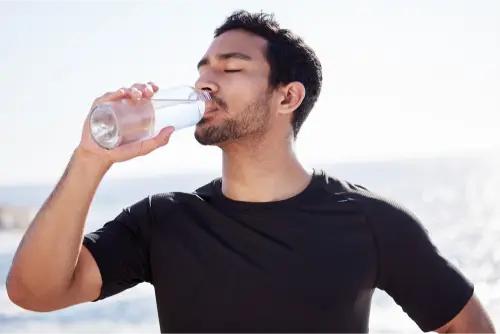Water is essential to life, playing a vital role in almost every function of your body. Yet, many people struggle to drink enough water daily, leading to dehydration and a host of health issues. So, how much water should you really be drinking each day, and why is it so important?
Why Water is Essential
Water makes up about 60% of your body weight and is involved in many critical bodily functions. It helps regulate your body temperature through sweating and respiration. Water acts as a lubricant and cushion for your joints, helping to prevent discomfort and injuries. It also helps protect delicate tissues such as those in your eyes, spinal cord, and brain. Water is essential for digestion, helping to break down food and absorb nutrients. Additionally, it helps your kidneys flush out toxins and waste products from your body through urine. Given its importance, staying hydrated is crucial for maintaining your overall health and well-being.
How Much Water Should You Drink?
The amount of water you should drink each day can vary depending on factors like age, gender, activity level, and climate. However, a general guideline is to follow the “8×8” rule: eight 8-ounce glasses of water a day, which equals about 2 liters or half a gallon. This is a simple and easy-to-remember target that fits most people’s needs. However, some experts suggest that men may need about 3.7 liters (13 cups) and women about 2.7 liters (9 cups) of water per day, including fluids from all beverages and food. Remember, fruits and vegetables like watermelon, cucumbers, and oranges contain high amounts of water and contribute to your hydration.
Factors That Influence Your Water Needs
Your specific water needs might be higher or lower than the general recommendations based on several factors. If you live in a hot or humid climate, you’ll need more water to stay hydrated, especially if you sweat a lot. Exercise increases water loss through sweat, so it’s important to drink more water when you’re active. Certain conditions, such as kidney stones or urinary tract infections, may require increased water intake. Additionally, if you’re sick with a fever, diarrhea, or vomiting, your body loses more fluids, and you’ll need to drink more water to replace them. Women who are pregnant or breastfeeding need additional fluids to stay hydrated. It’s recommended that pregnant women drink about 10 cups (2.4 liters) of fluids daily, while breastfeeding women may need about 13 cups (3.1 liters) daily.
Signs You’re Not Drinking Enough Water
It’s easy to forget to drink water, but your body will often give you signs that it’s becoming dehydrated. Feeling thirsty is the first sign that your body needs water. Dehydration can cause your mouth and skin to feel dry. Urine should be light yellow; dark yellow or amber-colored urine can indicate dehydration. Feeling tired or having low energy can be a sign that you need to drink more water. Dehydration is a common cause of headaches and can make you feel dizzy or lightheaded.
Tips for Staying Hydrated
Carry a reusable water bottle with you throughout the day to remind yourself to drink. Use your phone or a hydration app to remind you to drink water regularly. Incorporate more water-rich foods into your diet, such as fruits and vegetables. Don’t wait until you feel thirsty to drink water—by then, you’re already slightly dehydrated. If you find plain water boring, add a slice of lemon, lime, or cucumber to make it more enjoyable.
Drinking enough water each day is one of the simplest and most effective ways to support your overall health. While the exact amount you need can vary, aiming for about 8 cups a day is a good place to start. Remember to listen to your body, and increase your intake when needed, especially during exercise, hot weather, or illness.

